Sámi for life
It’s a simple class photo, in black and white. Twenty little girls, aged around 8 to 10, stare unsmiling at the lens, intimidated under their embroidered bonnets. “These are my two aunts and my mother,” says Rose-Marie Huuva[1], her finger sliding across the picture. In the café in Kiruna, in the far north of Sweden, where she has arranged to meet us, the Sámi poet, from the last indigenous people of Europe, has her archives, notes, poetry collections, fragments of family history, and her people’s history, next to her steaming cup. Rose-Marie has always known this photo. Her mother had a small reproduction of it at home, a souvenir of her years at the nomadic school where the children of Sámi herders were sent[2]. “But she didn’t talk about it,” says the poet. “It was only much later that I learned the context in which the photo was taken. And what probably happened afterwards.”
This picture is not in fact an ordinary school photo. It was taken by the Rasbiologiska Institutet – the Institute of Racial Biology – founded in Uppsala, north of Stockholm, in 1922. At the time, racial theory and its counterpart, eugenics[3], were particularly popular in Europe and across the Atlantic, and Sweden was a pioneer in this field. The Uppsala Institute was the first of its kind to be directly funded by a state, and its founder, Herman Lundborg, was a leading figure. Foreign researchers passed through its corridors to be inspired by Swedish methods, including Hans F. K. Günther, the future Third Reich eugenicist. They talked about cranial characteristics, the dangers of race mixing and sterilisation.
Throughout the 1920s and 1930s, the Institute sent its researchers to conduct field studies, particularly in the North, to classify the different populations of Sweden. There, they set about documenting their characteristics and way of life. All across Sápmi[4], men and women were gathered to have their skulls measured and photos taken, dressed and naked, front and profile, all with this cold scientific detachment. And since it was thought necessary to be exhaustive, the research was not limited to adults.
“My mother’s class photo was taken in 1931,” says Rose-Marie Huuva. “On that day, the children from the nomadic school were taken to the village. It must have been uncommon and exciting for them. But this picture was not the only one the scientists wanted. Afterwards, the children were taken individually to a room,” continues the poet, her voice vibrating with anger. “They were stripped naked and photographed. And nobody was there to protect them! No one!”
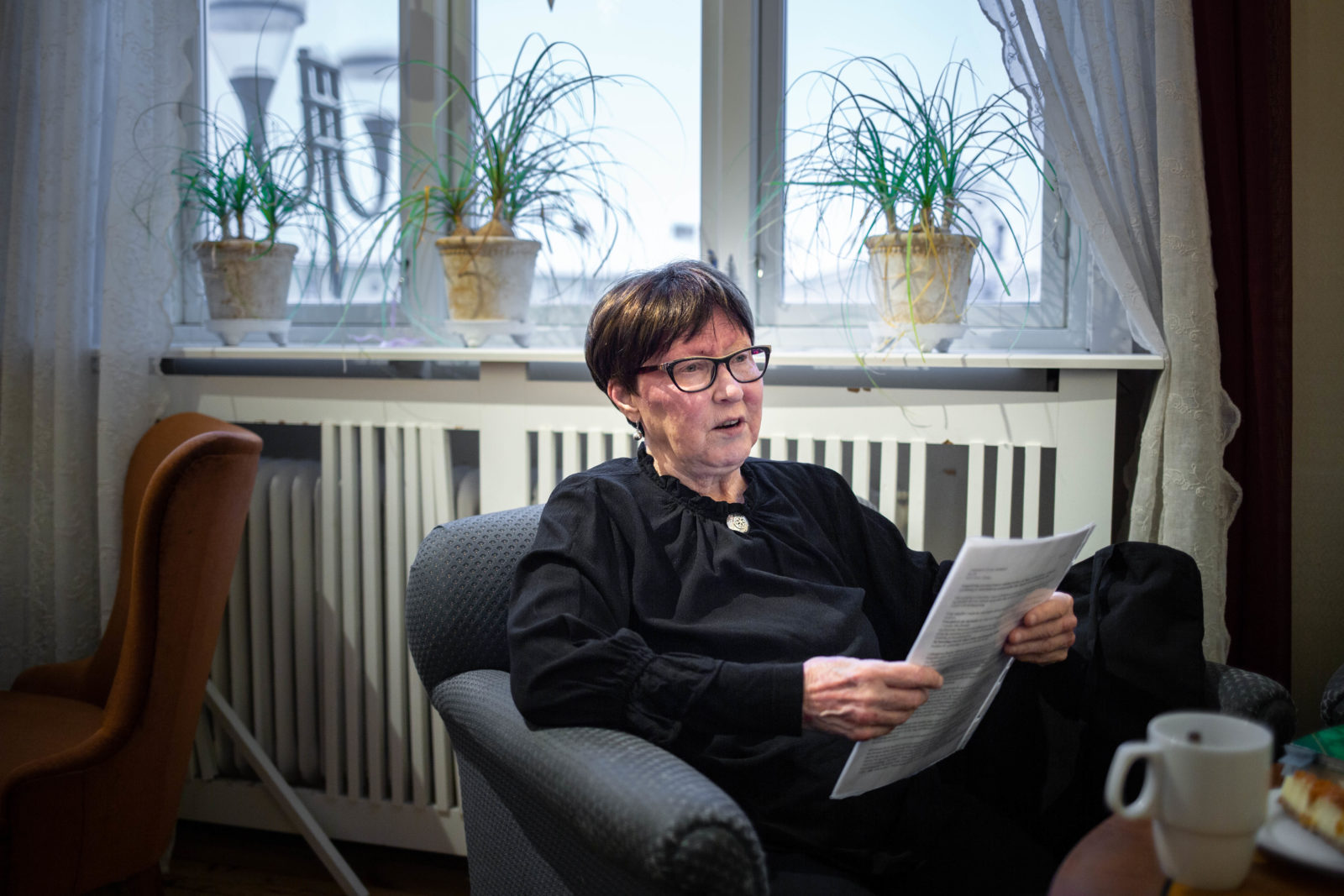
The poet Rose-Marie Huuva in Kiruna on December 7, 2021 – Photos Thomas Dévényi/Hans Lucas for Les Jours.
A few years later, echoes of the terrible German racial politics would somehow dampen the Swedish state’s enthusiasm for eugenic theories. The Institute was eventually reoriented towards genetic and medical research, and the sordid studies of the past were consigned to the archives – where they still reside. A thousand kilometres south of Kiruna, in the warehouses of the august Carolina-Rediviva Library, the 12,000 or so images collected a century ago by the Institute’s researchers lie in large brown leather albums. Anyone who makes a request is free to consult these documents – subject to a confidentiality agreement, due to the sensitivity of such archives.
This is where Rose-Marie Huuva went, 85 years after this particular class photo was taken. “When I discovered all the pictures, it was a real shock,” she says. “I walked out of the library and wanted to scream”. What upsets her so much is that these images “stolen” from the Sámi[5] people do not belong to them. “I don’t think they should be destroyed, it’s dangerous to want to erase the past. But we should be able to decide who has access to them and for what purpose,” she says, clasping her hands over her coffee cup, “because looking at such intimate images is like raping our loved ones a second time.”
A few blocks away, in downtown Kiruna, Rose-Marie’s friend Carina Sarri[6] has hung portraits of her great-grandparents, taken by the Institute a century ago, in her living room alongside her family photos. “What the Institute did was wrong, it’s painful to think that these images belong to that heritage. But on the other hand, these are the only photographs ever taken of my great-grandparents,” she explains. “Without them, I wouldn’t have any images to remember them by.”
“This is the ambiguity of research in the North in the 19th and 20th centuries,” says an employee of the Saami Parliament[7] a few days later. “While the practices and objectives of the Rasbiologiska Institutet are unjustifiable, many other researchers were studying our people at the time. There was this idea that the Sámi were a ‘first nation’ whose way of life had to be documented before it disappeared”. This anthropological approach was certainly imbued with a fascination for “savages” and a strong belief in the superiority of “civilisation”. “But today, this same research, however questionable, is one of the rare sources of documentation on our ancestors,” says the Saami Parliament worker.
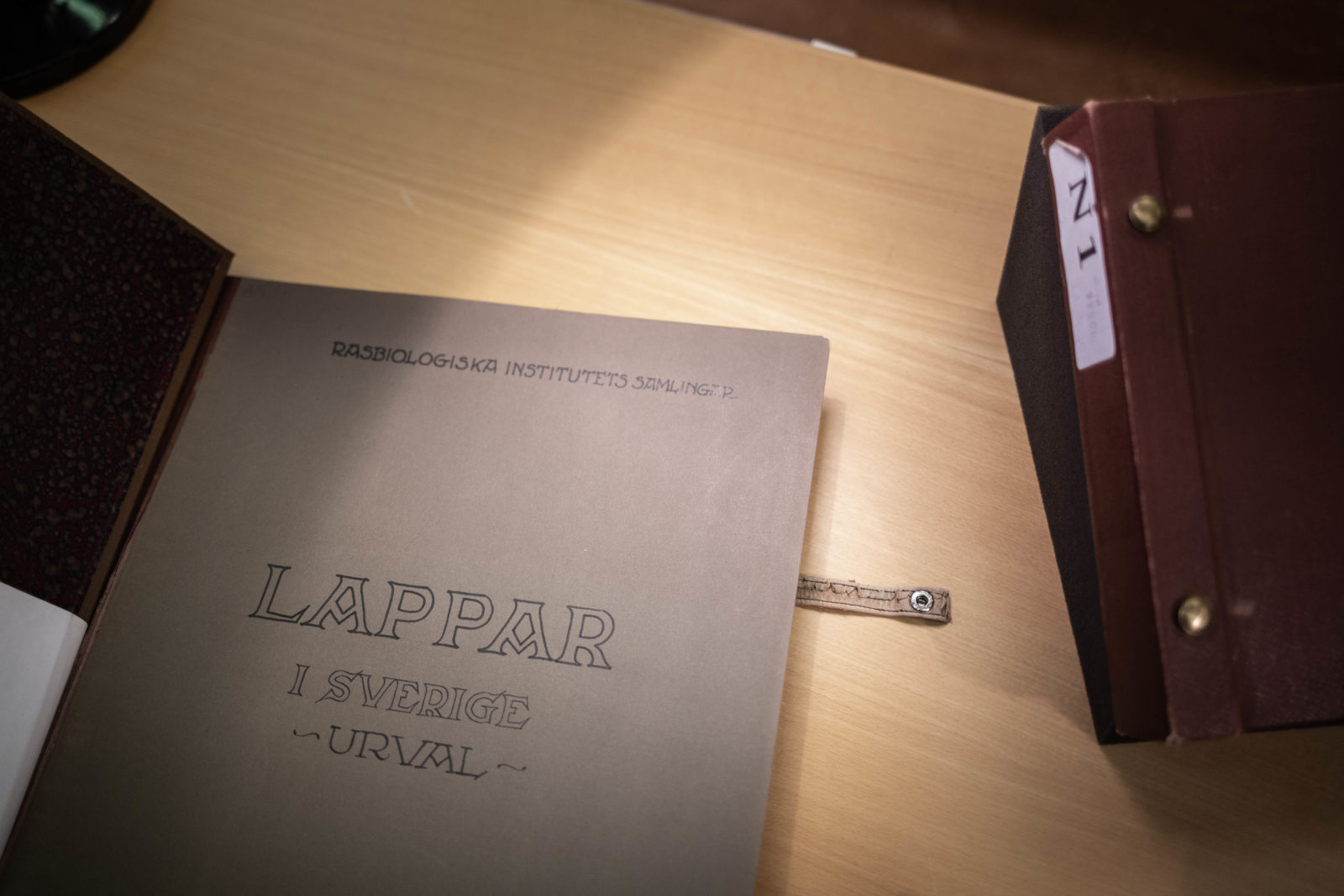
The archives of the Institute of Racial Biology in Uppsala, photographed on December 9, 2021, contain many photos of naked Sami – Photos Thomas Dévényi/Hans Lucas for Les Jours.
There is a thin line between exoticism and colonialism. It is that same curiosity that has led visiting researchers to take away many Saami objects. Like the sacred drums of the shamans of the past. Most were destroyed by the Swedish Church over the centuries, and today there are barely seventy remaining in museums and private collections. Only a handful are held by Saami institutions. In Sweden’s main Saami museum in Jokkmokk, four drums from the 17th and 18th centuries are on public display. “But they don’t belong to the museum,” says Tanja Sevä, an employee of the Saami Parliament. They belong to institutions in the south of the country, and are officially on loan. Even if this loan is for an indefinite period, “there is something strange about having to ‘borrow’ our heritage,” says the cultural department’s project manager. It is also strange to have to travel a thousand kilometres to admire the works of your ancestors in the capital. Today, the restitution of cultural objects is a real debate in the northern lands. “We probably won’t be able to repatriate all our heritage to Sápmi, and it may not even be desirable,” says Tanja Sevä, “but our people and our museums could at least have official ownership. Let us be the ones to lend our collections.”
It’s another, more sordid kind of looting that has preoccupied the Saami Parliament in recent years: the plunder of human bones, unearthed in northern cemeteries by researchers from all over the world. “Throughout the 19th and early 20th centuries, Swedish and foreign expeditions exhumed the bodies of our ancestors,” explains Rose-Marie Huuva. In the name of science, hundreds of skeletons were taken away, often with the collaboration of priests, for whom the eternal rest of the Sámi was of little importance.
For more than fifteen years, Rose-Marie Huuva has been campaigning for the stolen remains to be returned to the land from which they should never have been exhumed. This is a personal matter, because it was probably the skulls of her ancestors that were taken away by a scientific expedition in 1915 from the Ruonala cemetery in the far north of Swedish Sápmi. Tanja Sevä is in charge of this particularly difficult mission in the Saami Parliament. There are many obstacles and a lack of resources. The problem is knowing on which dusty shelves these stolen bones are stored.
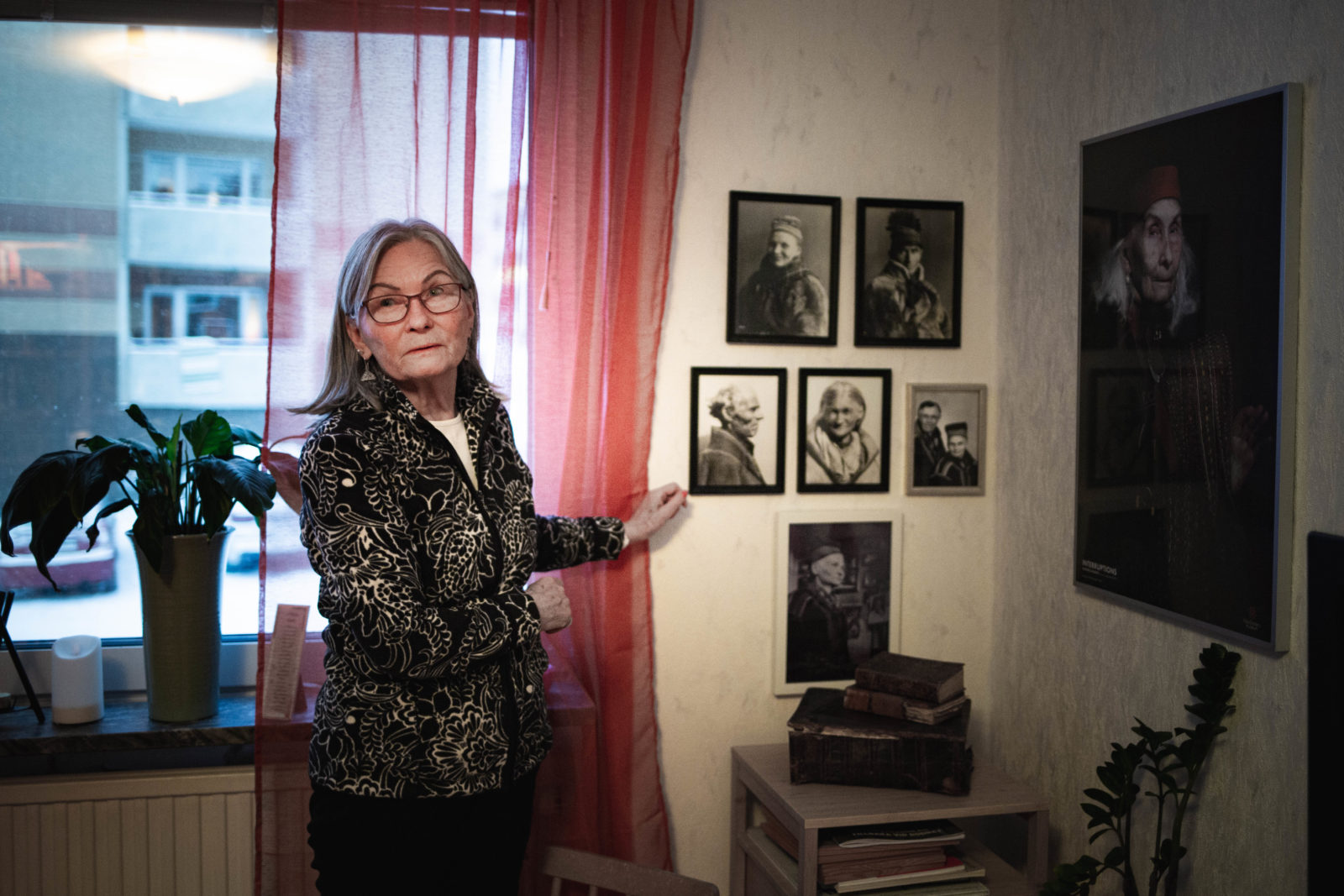
Carina Sarri shows photos of her ancestors, from the archives of the Institute of “Racial Biology”, which she hung at her home in Kiruna on November 25, 2021 – Photos Thomas Dévényi / Hans Lucas for Les Jours.
Although no one knows the exact quantity of remains that have been exhumed, it is estimated that at least one hundred – and certainly more – skulls and skeletons have been stolen from the cemeteries of Swedish Sápmi. The traces of these skulls and skeletons fade away with the miles and years. Where, for example, did the skulls stolen by “La Recherche” go? At the end of the 1830s, this French scientific expedition, led by naturalist Joseph-Paul Gaimard, stopped by a northern cemetery to exhume Sámi remains with the help of the priest Lars Levi Læstadius[8]. What happened to the “two bags full” of bones described in a letter from the priest, remains unknown.
In Paris, London and Berlin, probably dozens of bodies remain in archive boxes or private collections. From the 19th to the early 20th century, native skulls were prized objects that some collected and others traded like marbles. Tracing these human remains resembles a police investigation, and requires resources that Tanja Sevä simply does not have. “There are two of us in my department working on this issue, and it is not our only mission,” she sighs. So, for the time being, she is concentrating on the northern lands, which are more directly involved in the macabre trafficking of the past.
“We know that about one hundred bodies are in the archives of several museums in Sweden, Norway and Finland,” explains Tanja Sevä. For the former archaeologist, the work has also become personal. “I discovered last year that bodies exhumed in my home village, and therefore probably some of my ancestors, are now in Finland”. Across Sápmi, many families are also wondering about this, as there have been so many unauthorised exhumations. And in the northern regions, the subject has become a hot topic. “Today, Scandinavian museums know that this is bad for their image and are collaborating with us,” notes the project manager. The final irony is that the bones can only be returned to the ground with the express permission of the Swedish government, on the recommendation of the museum that “owns” them. From an administrative point of view, these skulls and skeletons have become “museum objects”, says Sevä, “objects” that the Sámi people “destroy” by burying them in their ancestral land. Moreover, these restitutions come at a cost. “And it is not the responsibility of our people to pay for it,” says Sevä, who hopes to obtain state funding.
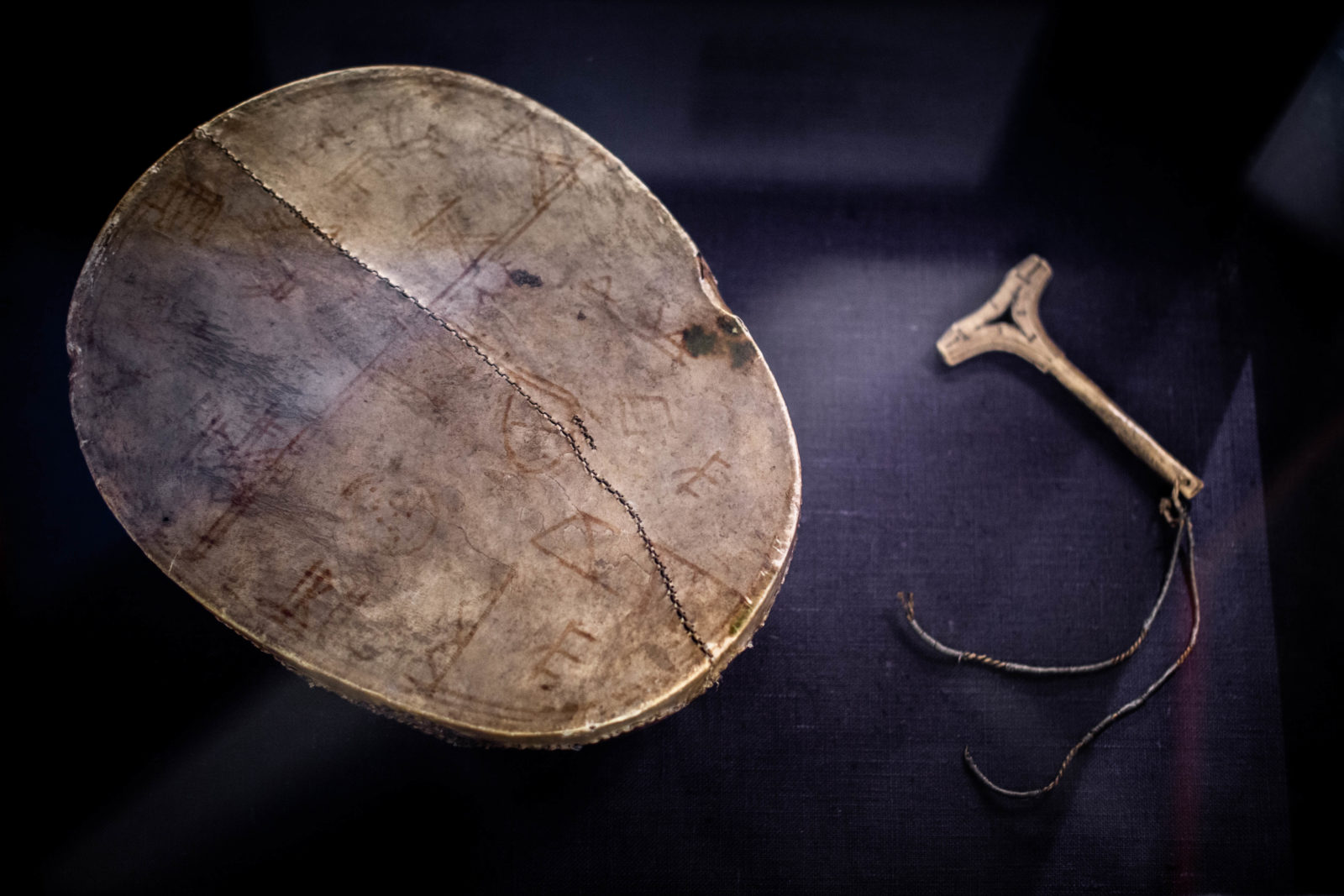
A sacred drum at the Sami museum in Jokkmokk, December 4, 2021 – Photos Thomas Dévényi/Hans Lucas for Les Jours.
In recent years, only five restitutions have occurred in Swedish Sápmi. The largest was organised in 2019, in Lycksele. “Thirty skulls and four skeletons were exhumed during an archaeological excavation in the 1950s, before the installation of a hydroelectric power station,” explains Mikael Jakobsson, leader of the local Sámi community. Five of the skulls and all four skeletons were never returned. They disappeared. The remaining twenty-five skulls were returned to the earth in a large ceremony in August 2019. Rose-Marie Huuva carried one of the coffins. “It was moving and important. What is buried in the earth should remain buried.”
Over the years of wrestling with the issue, the poet, who once wanted to be buried like her ancestors before her, has changed her mind. “Many of us Sámi now prefer cremation,” she says. “Is it the impact of history? I don’t know”. But as long as she is alive, this past will haunt her. Like this image, which she describes in a poem[9]:
“The headless skeletons
Of ancestors
Wait in their graves for
Resurrection.”
[1] Rose-Marie Huuva
Sámi artist
Rose-Marie Huuva is a renowned poet and visual artist from the Swedish Sámi community. She explores the different facets of Saami culture and exposes the darker side of Scandinavia’s colonial past. As a poet, she writes in Northern Saami and then translates into Swedish. “Keeping our language alive from generation to generation is a constant struggle,” she says. In the late 2000s, she convinced the Swedish Saami Parliament to make the restitution of remains stolen from Sámi cemeteries in the 19th and 20th centuries a priority. By dint of letters, petitions and public appeals, she got the attention of Stockholm and the museums of the South. For Huuva, this is personal. For it was probably the skulls of her ancestors that were taken by a scientific expedition in 1915 from the cemetery at Ruonala in the far north of Sweden’s Sápmi region. Long kept in the archives of the History Museum in the Swedish capital, the bones have been repatriated to Jokkmokk, where they are still waiting for the Swedish government to authorise their burial.
[2] Read Episode 4 of the serie « Samis pour la vie » : “In Sweden, is the Saami Parliament enough?”
[3] Racial theories and eugenics
Based on the theory that there are human races and a hierarchy between them, eugenics aims to select the genetic make-up of future generations by eliminating the transmission of any trait deemed a defect – a disability, a tendency towards alcoholism or any other social vice, or membership of an “inferior race”. In practice, these nauseating ideas led to various policies of forced sterilisation in Europe and in America, and to the “Final Solution” in Germany.
[4] Sápmi
Four states and three borders
From northern Norway to the Kola Peninsula in Russia, via the Swedish and Finnish Arctic territories, the Sámi territory has never been independent. The region is more commonly known as “Lapland”, derived from the name the Scandinavians gave to its majority population, the “Lapps”. They call themselves “Sámi”, and although their land has no borders of its own, many speak of “their country”, the Sápmi. Some 400,000 km² (160,000 of which are in Sweden) of forests, mountains and swamps where one encounters reindeer herds, lynx and solitary elks. In summer, swarms of mosquitoes hover over the tundra and the sun blazes all night, before the land freezes under ice and snow for more than a third of the year, and the northern lights illuminate the sky. The region’s mining, water, forestry and oil resources have contributed greatly to the economy of the Scandinavian nations and are now the keystone of their energy transition.
[5] Sámi/Saami/Sápmi [Sami/Sâme/Sapmi]
The term “Sámi”, which refers to these people in their languages, is translated abroad as “Sámi” [Sami] or “Saami” [Sâme], depending on the text. They refer to their ancestral territory, which stretches from Norway to the western peninsula of Russia, as Sápmi [Sapmi]. Here, we have chosen to use “Sámi” [Sami] to refer to people and “Saami” [Sâme] to refer to language, culture, institutions…
[6] Carina Sarri
Saami memory
A former teacher, Carina Sarri helped found Sweden’s first Saami nursery in Kiruna in 1983, and preserving the language has been her life’s work. “In the past, people in Sápmi spoke several languages,” she says. The region had a rich variety of cultures. But as Sweden’s assimilation policies continued, Saami languages were passed down less and less through families.
Now retired, Carina Sarri continues to participate in Saami language preservation programmes. And in her own way she preserves the memory of those who came before her. Her flat in Kiruna is like a small museum of intimate memories. It houses her family’s objects – the wooden cradle her grandfather made when she was born, designed to be carried on the back of a reindeer, her mother’s childhood doll, the only toy she ever owned – and portraits of her lineage.
[7] The Saami Parliament
Managing Sámi affairs
Founded in 1993 following the creation of similar bodies in Norway and Finland, Sweden’s Saami Parliament – Sametinget (in Swedish) or Sámediggi in Northern Sámi – is more of a government agency than a legislative body, despite its elected assembly.”Day-to-day, the Sámediggi deals with the management of Sámi affairs, from reindeer husbandry to cultural projects,” says its administrator, Fredrik Österling. But it has no power to legislate, only to be consulted by the Swedish government. The Saami Parliament has offices in four towns in Sápmi, about 60 employees and an annual budget – allocated by the Swedish government – of 66 million kronor (6 million euros) to manage various projects related to Saami culture. In addition, there is an extra allocation of 120 million kroner (11.2 million euros) just for managing the reindeer husbandry industry. Three to four times a year, its 31 members of parliament gather in plenary session in one of the main cities of the North. There are 10,000 registered voters.
[8] Læstadianism
A protestant religious movement founded by the priest Lars Levi Læstadius (1800-1861), of Sámi origin. Although it was a conservative Protestant movement, it spread widely among the Sámi population and was also inspired by the Sámi relationship with nature. The personality of its founder remains controversial, both for the extreme rigour of his doctrine and for the trafficking in Sámi skulls in which he is reported to have engaged.
[9] Poem
From the Saami poetry anthology “Viidát: divttat Sámis = Vidd: dikter från Sápmi” (Podium, Stockholm 2006), this poem was read by Rose-Marie Huuva at the Swedish Church’s official apology to the Sámi people for past abuses on 24 November 2021.
Translation by Ciaran Lawless / Voxeurop.
Defined by silence
Despite the fact that these days, so much is being said, shown, and written about Ukraine and the war that Russia waged on her; despite all the news, numerous interviews and videos of President Zelensky speaking to whoever is willing to listen; despite constant buzz in the Ukrainian segments of social media where people coordinate humanitarian help, support to the territorial defense units, the relocation of people, and million other urgent matters; despite all these the inner condition, the state of being of the country is probably best defined by the word ‘silence.’
Silence can stem from different circumstances and possess various qualities. It can be voluntary or forced, deafening or revealing, powerful or paralyzing. What unites all these is absence as an antonym to presence; the absence of something that could have been but is not. This silence in Ukraine in the middle of murderous noise is the absence of the words, expressions, thoughts, actions, intentions that could have been said, stated, done, shown, uttered if there was no war.
Silence also does not necessarily mean the absence of people, quite the contrary – the more people whose voices have been silenced, the more deafening and horrible it grows. This is especially true when talking about culture: Ukrainian culture today is a void compiled of empty spaces that could have been filled with books, exhibitions, performances that did not happen – and most probably, will not happen for a long time.
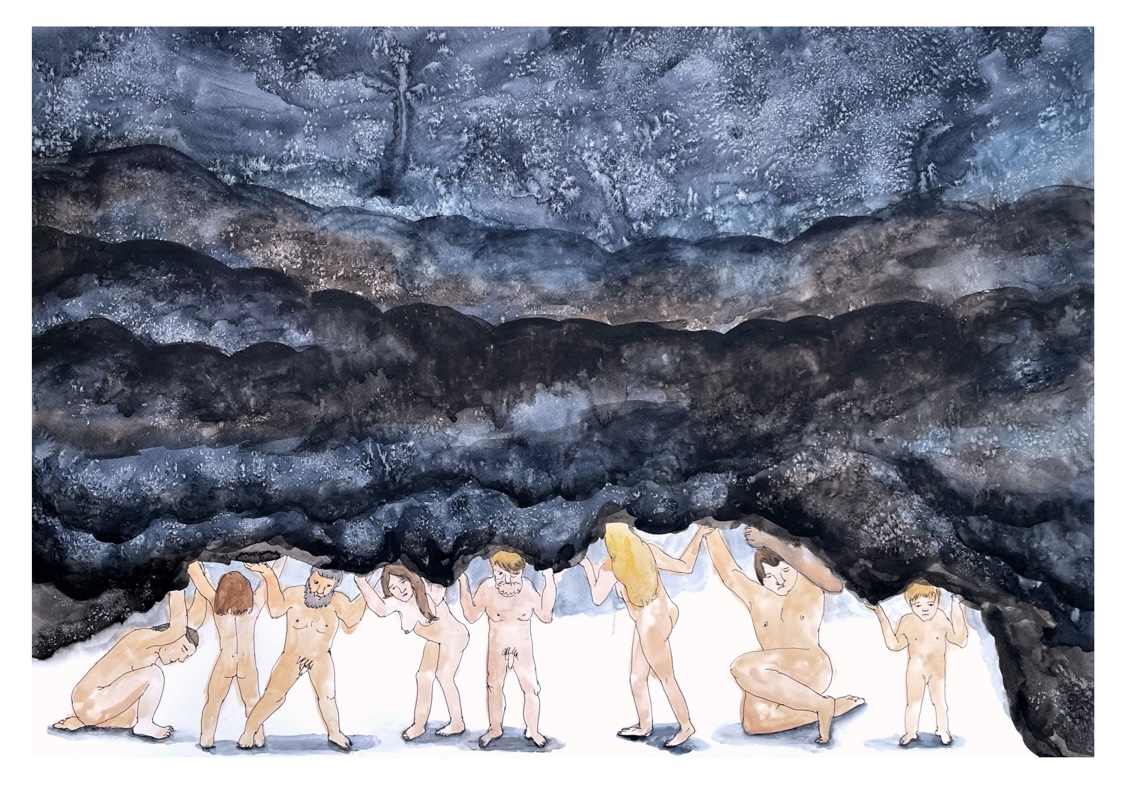
Kinder Album: Ukrainian Titans Holding Up the Sky. 2022, published on Instagram. Image courtesy of the artist Kinder Album.
Back in 2014, at the de facto onset of the current invasion – occupation of Crimea and the war in Eastern Ukraine, – the outstanding Ukrainian writer Oksana Zabuzhko switched from her writing to producing endless interviews and articles, predominantly for western media. She called it ‘getting into a tank’ – an expression which later became a title for her collection of essays and interviews.
Yet again, everything was brought to a halt on 24 February this year, but on much larger and more terrifying scale.
This time another outstanding Ukrainian writer, Sofia Andruchovych wrote: ‘Before the war, I was a writer. Today, on the ninth day, I feel unable to string two words together’.
Film director Marina Stepanska stated on her Facebook in A Letter from Ukraine: ‘I used to be a filmmaker, now I’m not.’
Meanwhile, artist Lesya Khomenko left everything in her studio in Kyiv and took to Ivano-Frankivsk in Western Ukraine with her daughter, and started a lab for displaced artists. She calls it ‘a therapeutic space’ to look at the current situation and try to deal with it through collaborative work. She says, ‘We left all our works behind, we are left with nothing, without a biography. When some might have their works digitalized, others like myself have only material pieces.’
So, what are the voices of the silence? What happens to art (and artists) during the war? The question is twofold. One problem is what happens instead of art that did not happen. The other: what happens to art that already happened.
The art that already happened
A few days after the war started, globalmedia picked up the story of Maria Prymachenko’s works being destroyed as a local history museum burned down after missile hit in Ivankiv, near Kyiv. The story went viral spreading from arts magazines and newspapers to mainstream media: colorful phantasmagoric images of Prymachenko’s imagined flora and fauna covering printed pages and newsletters.
Shortly after, thenews surfaced that some of the paintings may have been saved by locals – maybe even more than those destroyed. It is worth noting that the main collection of her works was stored elsewhere in the first place. Yet, this information never made it to the top headlines, and neither did the news about the destroyed or severely damaged museums in Kharkiv, Mariupol, or Chernihiv.

A powerful visionary painting by Maria Primachenko: May That Nuclear War Be Cursed! 1978. Fair Use via Wikiart.
Was this information simply swallowed by the tsunami of other news? Lost among the daily reports of children being killed, civilians kept hostage, whole cities destroyed? Maybe people simply more important than artworks, allowing the threat to lives overshadowing the problem of cultural heritage? It may have been affected by the authorities’ reinforced demand not to publish any visuals and not to disclose the locations of the missile hits and destruction?
Or was this silence already internalized and accepted? Did museum workers and cultural professionals remain silent because they understood that any information about the collections, their whereabouts, their conditions or further prospects equaled putting a target on them?
On the other hand, the uproar about the destruction of Prymachenko’s works might have concentrated on something other than the artist, or even the works. It might have been another omission created by the war, a tangible example of loss when destruction was the only story to tell.
In war, the materiality of destruction prevails over the materiality of existence. The physical pressure and the finite mass of the rubble left after the missile hits a building feels like the end of the sentence. All said. Period. Nothing can be done. Time to move on.
But those who survive, be they people or objects, need their stories and histories. Without them, Prymachenko stays a ‘folk’ artist whose works appeared on postal stamps, was awarded an art prize (notably, both these happened still under the Soviet Union), and was praised by Picasso. These little scraps of info were mentioned all over international media.
In this context, her unique story as an autodidact who never left her village, her cosmovisions of interconnectedness of life that blurred the borders between the reality and dreams, the role of her works for the generations of Ukrainian artists and in forging Ukrainian cultural identity have no place and no attention. In the place where a story should be told, there is silence.
Even more silence occupied places of stories that could have been told. Museum collections are stored in basements in undisclosed locations,: and museum directors refuse to talk about the specifics; activists raise funds and collect basic necessities to support the people who save the artworks. Grassroots initiatives like the Museum Crisis Center provide packaging material and fire extinguishers, prioritizing museums in small towns and villages. These objects of varying value, origin, and provenance,are parts of a cultural heritage that would need to be exhibited, contextualized and analyzed, woven into the complex history of a country whose people were deprived of history for a long time. But right now, security prevails over the need of storytelling.
And then there are the artworks of living artists too, left in studios and galleries basements, sometimes rescued by volunteers or fellow artists, sometimes already lost forever.
The art that did not happen
If some of these works are never to be recovered, what does it make them? Will they be merely a ‘lost biography’, in Lesya Khomenko’s words? Are they an already lost heritage? And what’s the difference? When and if the images, the digital copies of these works are to be exhibited sometime in the future, how will the present, material objects created by the same artists during the war look next to them? Perhaps, there will be a note, a small caption next to each of them saying something like ‘This work was not the one planned by the artist or created out of her/his good will. It was created by the war.’
Alevtina Kakhidze is one of the artists to document her experiences since the second day of the war, utilizing her vast international recognition and network all over Europe and in Russia. In her first war drawings – the first pages in her ongoing visual diary published on her Facebook page –, Alevtina tried to call on Russian artists and intellectuals to take to the streets.
Over the next days and weeks, she and her husband in their house in the suburbs of Kyiv with their dogs, enduring shelling and the threat of the possible invasion, her drawings transformed into imprints of her daily experiences. Starting from sleeping in the basement without electricity or internet connection, spanning all the way into visual discussions about the origin of Russian imperialism and the need to decolonize Russian culture.
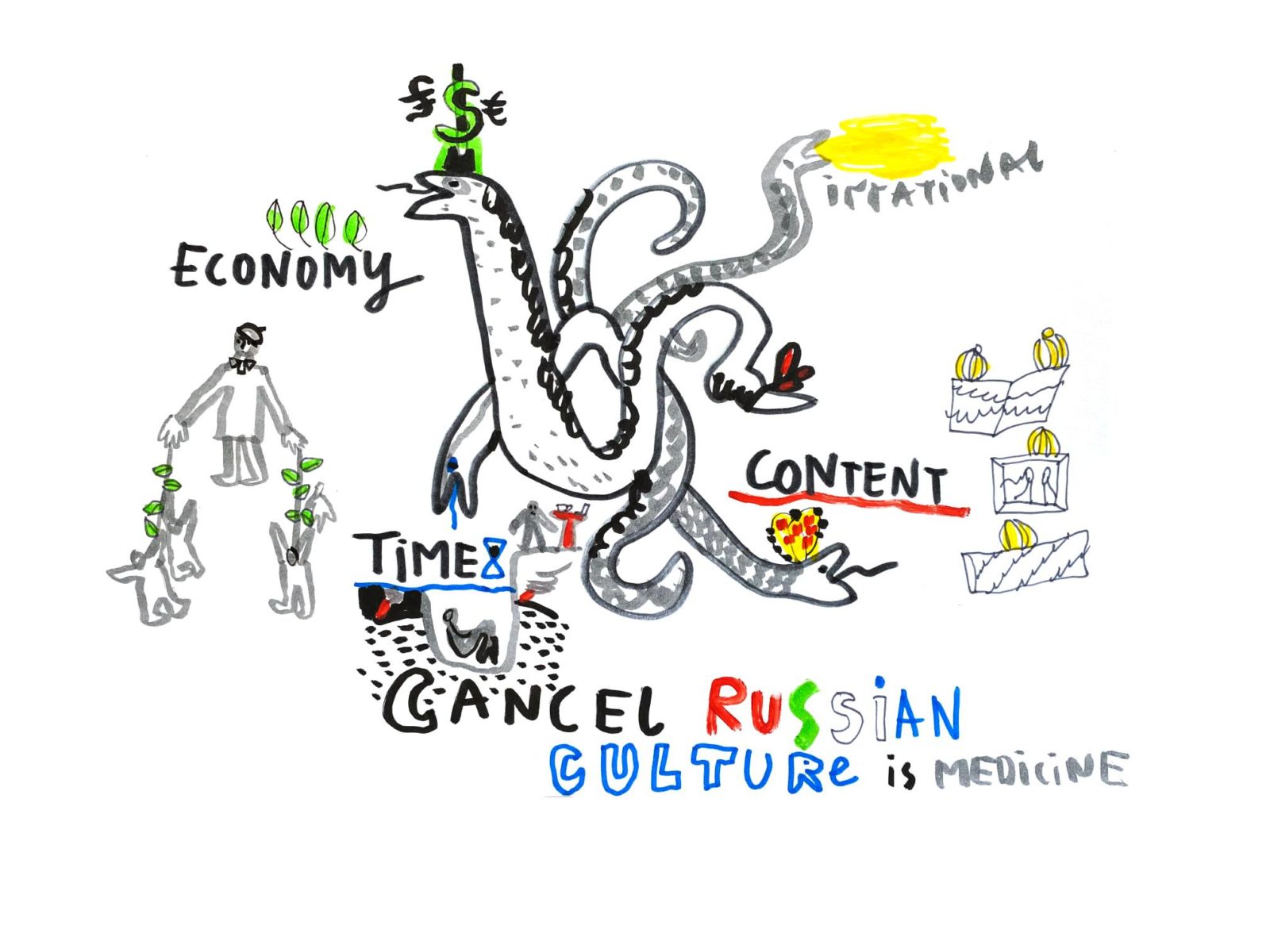
Alevtina Kakhidze, Cancel Russian culture. 2022, published on Facebook. Image courtesy of the artist Alevtina Kakhidze.
Alevtina, who is also a performance artist, picked up her peculiar visual language of fast drawing, small on-the-go sketches in a previous series of works where she criticized consumer society. But her world changed in 2014 when war became a huge part of her realilty because her mother, as so many other people of age, refused to leave their homes on the occupied territories in Eastern Ukraine.
Phone calls between mother and the daughter, sketches of the mother’s life under the occupation, and other aspects of the war’s political reality built up an extensive visual diary; 2D performances where colorful schematic figures were surrounded by words in different languages – Russian, Ukrainian, English.
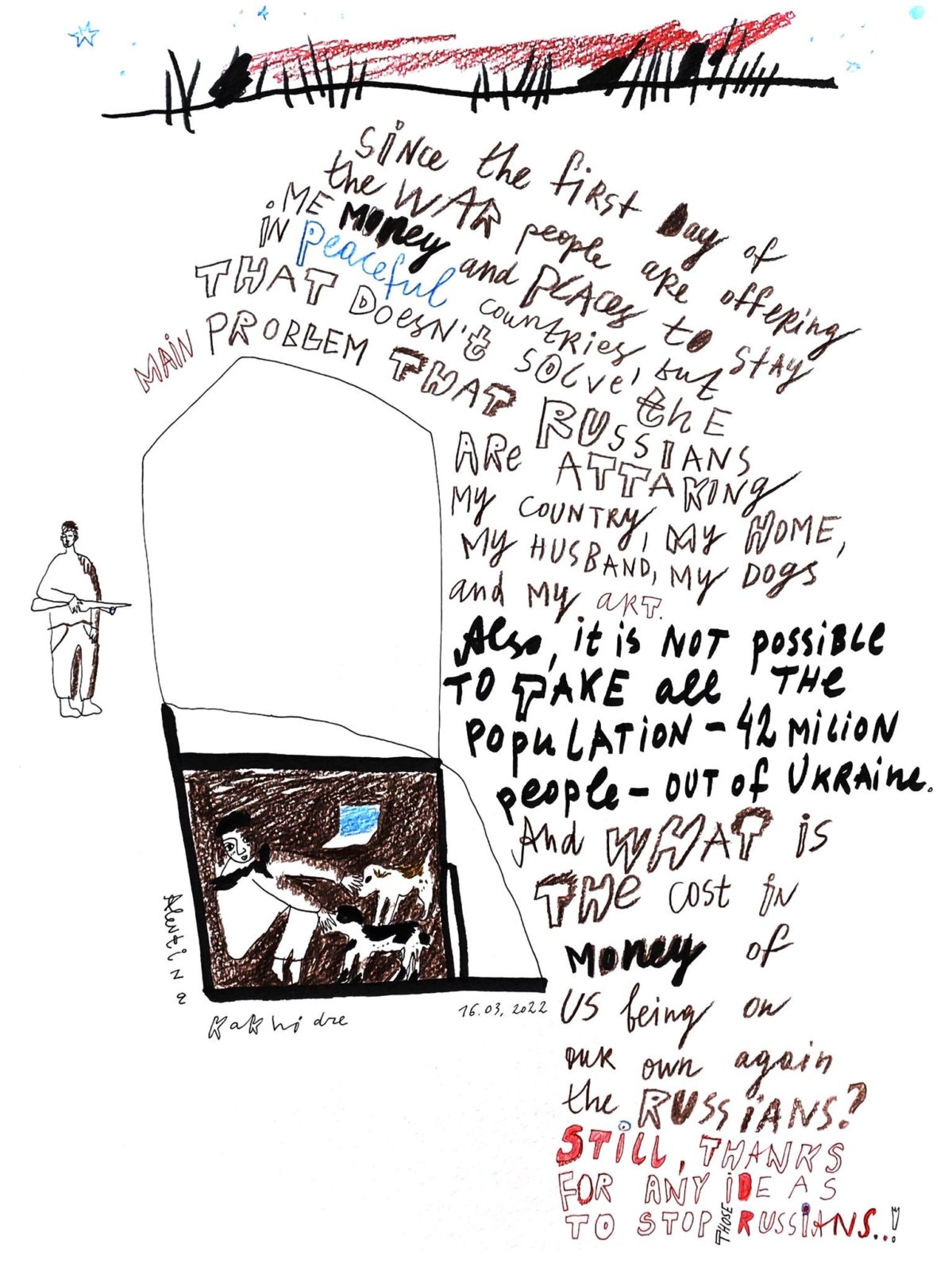
Alevtina Kakhidze, Birthday. 2022, published on Facebook, available via Artists for Ukraine. Image courtesy of the artist Alevtina Kakhidze.
These drawings from 2014 on are not sketches for something else, not preparation for the bigger work, as artists’ diaries and sketchbooks often are. They are snapshots of the moment, visual notes, messages mainly to oneself (and then, to others) not to forget, not to let go even if sometimes that’s exactly what one yearns to do..
Maidan, the occupation of Crimea, and the war in Donbas have changed not just the visual language, but the way artists perceive themselves. As many said during, and especially right after Maidan: when the unthinkable and unimaginable was happening, artists turned into regular citizens, activists, human beings doing whatever they could to help the situation. Even more important, however, was that the inner permission ‘to not be an artist’: allowed not to imagine or reflect, let alone represent, but instead collect, record, save, and try to keep reality intact.
Already then, eight years before the full-scale invasion and war unfolded, artists were collecting the evidence of atrocities. The struggle for a visual language to grasp and speak about the reality was an attempt to (re)claim agency and to own the narrative, to dare and see the war and its aftermath with their own understanding, not through the imagery supplied by mass-media or commercial culture, and avoiding the recycling art of other wars or conflicts. The aim has been to build a unique form of expression, one that transcends mere tropes; one that is true to the reality of the here and now.
Peripheral vision
Writing about the frames of war, Judith Butler inquired about how the framing of the image of war through cameras affects the materiality of war and influences public discourse about it. She extensively analyzed how the frame of an image includes and excludes certain parts of a narrative, forming resistance potential on the margins; in those zones of exclusion something is undisclosed and the numbers of casualties are not self-explanatory (1). However, Butler writes about the politics of framing the materiality of war for the external gaze. But what happens on the inside, when the perception is framed by someone’s own eyes? What will fall on a blind spot, what is oushed to the periphery?
For those living the daily reality of this current war, the materiality and violence are framed by the Ukrainan government’s explicit ban on the use of the immediate images of destruction – this ban was introduced for security reasons, however, there is an increasing number of cases of international media and Telegram channels violating this ban.
This experience is complemented by the unspoken expectation of international media to limit the expression of strong emotions. It somehow seems that being openly emotional, like expressing pain or rage, deprives the speaker, regardless of her or his recent experience, of the assumptions of rationality, dignity, and thus of agency and a valid voice.
It is on the margins of this frame that artists often step in.
‘My husband, artist and musician @maxrobotov is a lieutenant in the Ukrainian army now. He sent me his photo because I was curious what it looked like. Taking photos of soldiers and military objects is forbidden now in Ukraine because of the war. Before the escalation of the war, I was contemplating the commonalitiesof the military optic and artistic view. Max represents both positions now,’ wrote Lesya Khomenko on her Facebook page in mid-March. Below is her painting of the photo of her husband, bareheaded, in half-military half-civilian clothes, giving military salute. It’s her first work after February 24 and after relocation to Western Ukraine. Somewhere behind the surface of this clearly distanced, even formal painting and behind the artist’s calm words is fear, suffocating fear never to be able to see your loved one again.
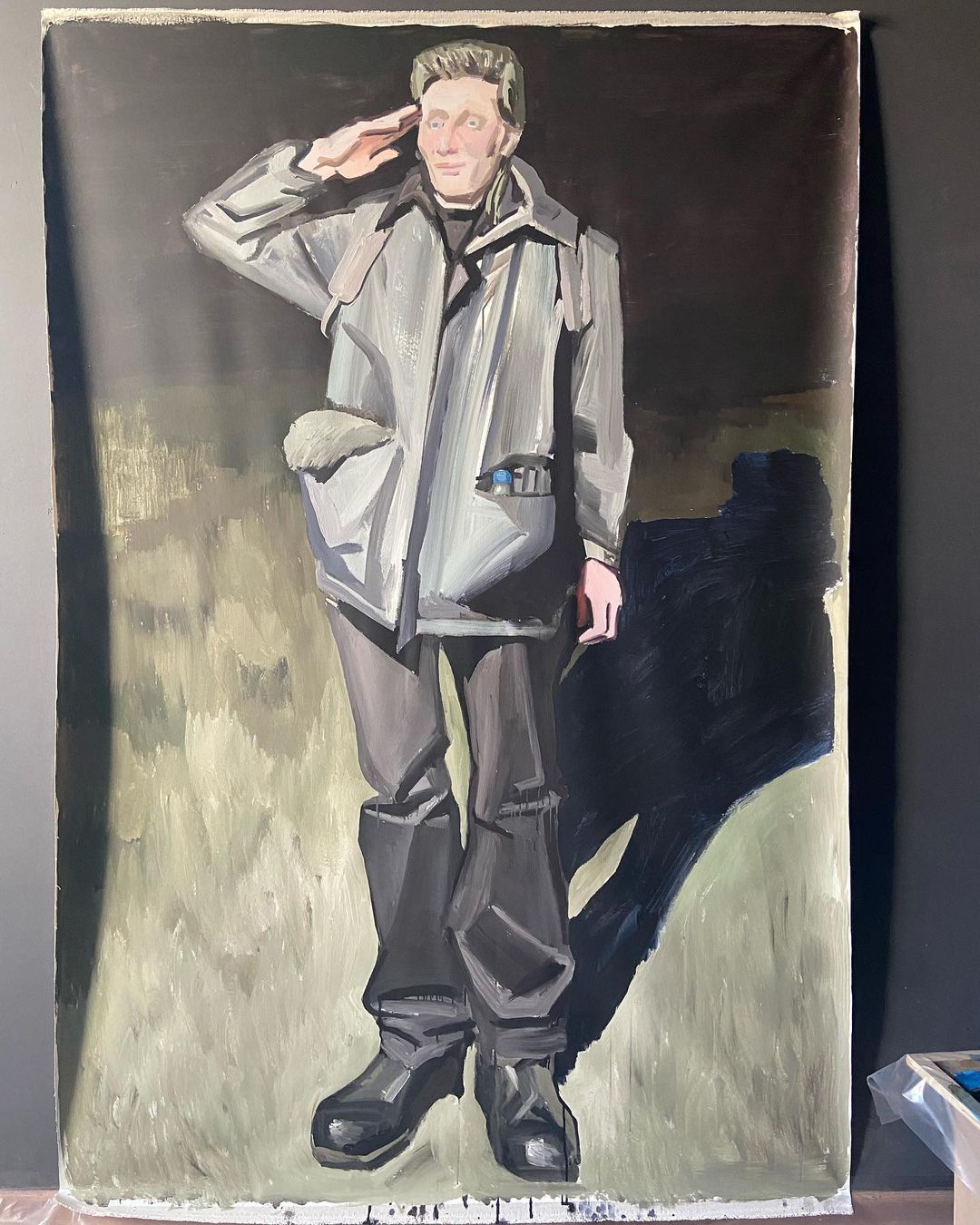
Lesya Khomenko’s portrait of her husband, based on a photo, 2022. Image courtesy of the artist Lesya Khomenko.
Kateryna Lysovenko spent a few nights in a bomb shelter in Kyiv with her two children and a cat before relocating first to Lviv, then to Poland, and soon to Austria. Lysovenko created a number of smaller watercolours while on the road. Schematic, flat, almost faceless figures stand against the grim background, almost dissolving in it. One of the works says ‘Propaganda of the living world. Stop murder.’

Kateryna Lysovenko, Propaganda of the living world. Stop murder. 2022. Image courtesy of the artist Kateryna Lysovenko.
The living world, human and non-human relations, care for the world but also the care of a mother for her child had been Kateryna’s topics well before the war. Arriving in Poland, lost and disoriented, her children deeply traumatized, she got a residency support from BWA Zielona Góra. There she goes back to large-scale painting: human figures get more shape and sometimes even faces, they are mostly female, carrying or holding, sometimes cradling children. She’s almost back to her usual imagery with a few striking exceptions, however: on most works, the colors are gone or faded, and once in a while, maybe on especially emotionally hard days, the strong corporeality of bodies shrinks again to small, shapeless figures, piled up in a mass graves or spread on the ground, raped, bleeding.

Kateryna Lyvosenko, They Can Repeat. 2022, published on Instagram. Image courtesy of the artist Kateryna Lysovenko.
Accompanying the images of her works on her Instagram, another diary of the war, the artist writes, ‘I carry gardens of sorrow, gardens of anger from irreparable loss, I remember everything that disappears, I want to breathe deeper to accommodate more, I am now a moving cemetery.’
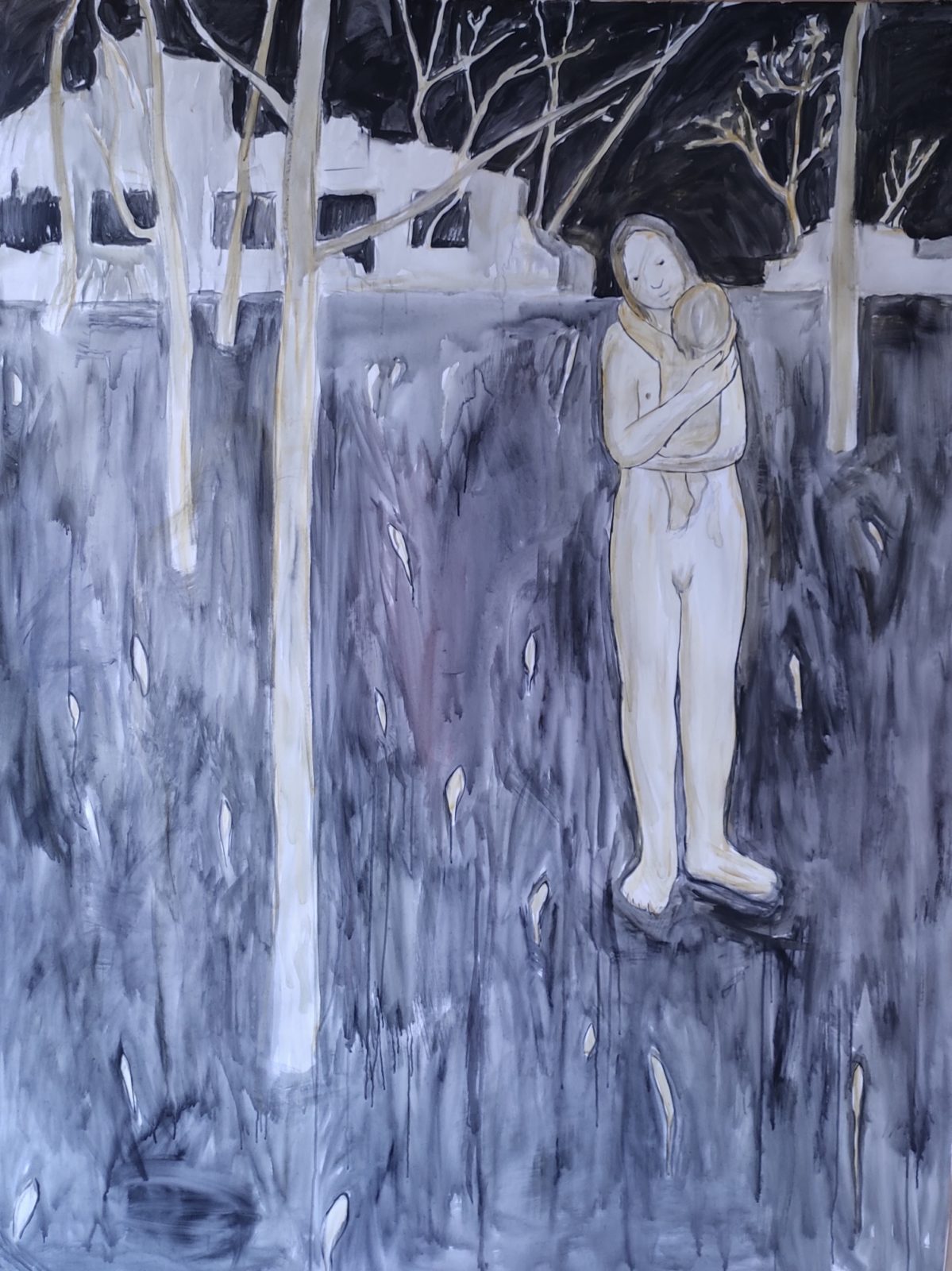
Kateryna Lysovenko, Gardens of Sorrow. 2022, published on Instagram. Image courtesy of the artist Kateryna Lysovenko.
Bodies, shapeless ones looking more like outlines or abstract figurines or more definitively feminine, are one of the main symbols in the imagery of this war. Shapeless ones usually come en masse – in bomb shelters or train stations. Female ones, naked and apparently vulnerable, protect, embrace, or stop the tanks, like in the works of the female artist who works under the alias Kinder Album; iothers grow into and with the nature, turning into birds, animals or vegetation, like in works by Sana Shakhmuradova.
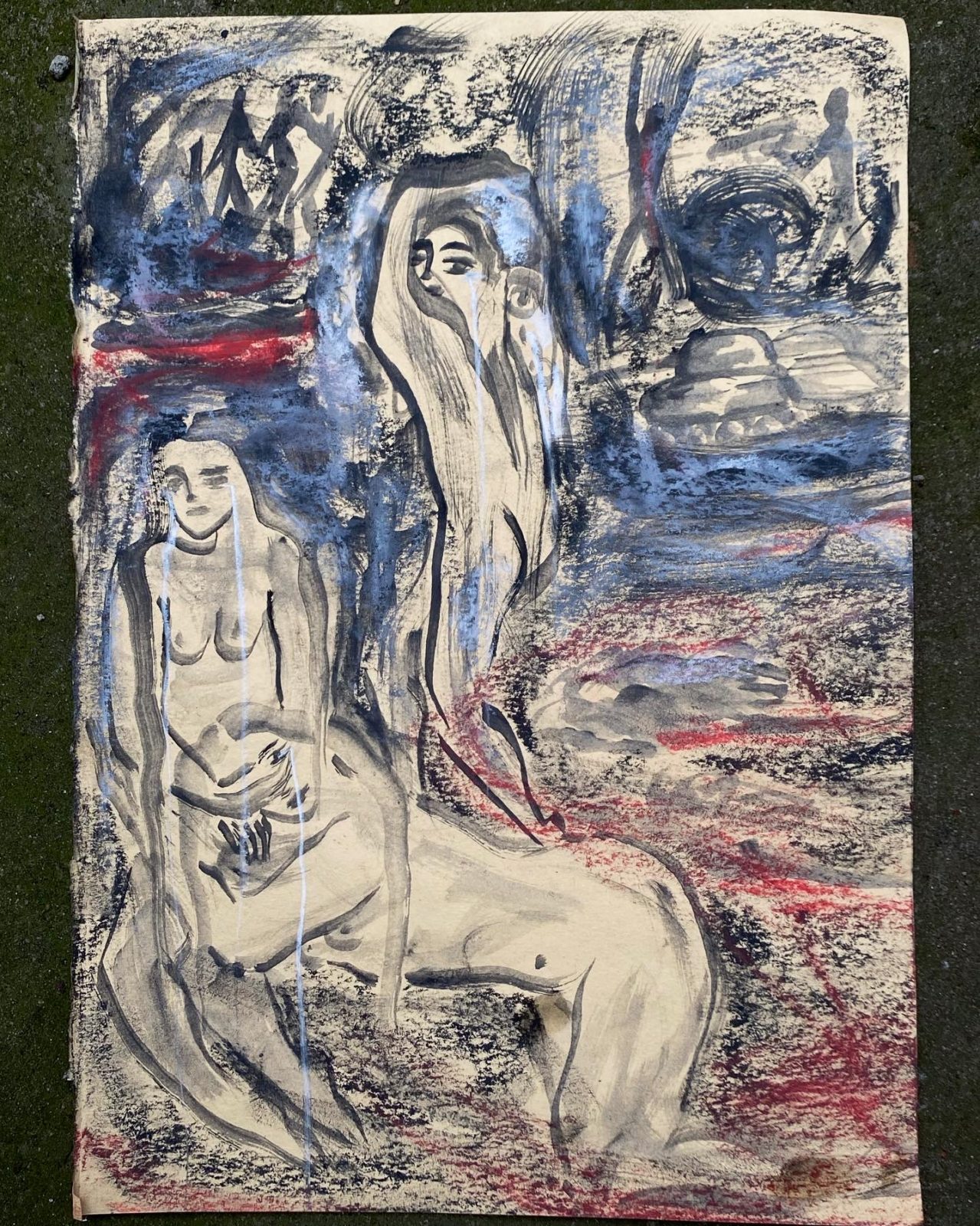
Sana Shakhmuradova: Dedicated to victims (women, children, civilians) raped, tortured, suffered and died because of Russian inhumane attack and violence. 2022, published on Instagram. Image courtesy of the artist Sana Shakamuradova.
The imagery and symbolism of these and many other artists’ diaries are very simple and schematic, lines are fast, colors are rough, emotions are raw. Even if already exhibited somewhere in exile, these works are still mostly meant as notes to oneself, semi-public diaries available on social media, a regular exercise in seeing and feeling without a chance to escape.
They remind of what is seen should never become unseen and what’s been understood can never be dismissed. The overwhelming reality of this war needs to find its way onto the physical surface of paper, canvas, or wall, to stop it from being forgotten.
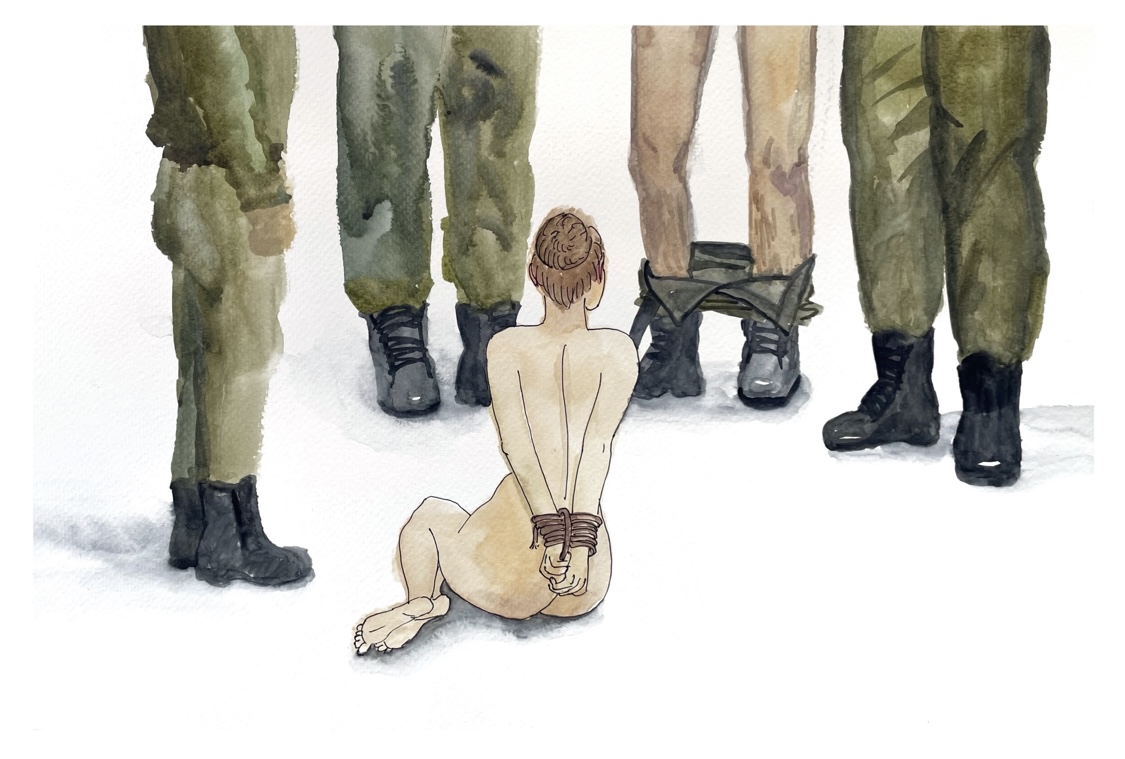
Kinder Album, Russian Soldiers Rape Women in Ukrainian Cities. 2022, published on Instagram. Image courtesy of the artist Kinder Album.
As for male artists and the male imagery of the war, the silence is even more literal. Many notable artists as well as writers, actors, film directors, researchers, and other intellectuals, voluntarily enlisted either into the army or into the territory defense units. The works they could have drawn, painted, written, filmed, is now covered in the throbbing silence of the war.
Testimonial
International discussions about the role and function of art in the war are tailored to notions like ‘healing’ and ‘peaceful mutual understanding.’Neither of these are expressed in the current works of Ukrainian.
It is testimony, it is the evidence of the tragedy that should have never happened, but indeed it has. It’s a powerful emancipatory work to create a visual language that can grasp these events, the loss, the emotions; to record this particular present in a new, uncomfortable yet distinct voice.
After the first major wave of the pandemic, Cameroonian philosopher Achille Mbembe wrote, ‘fundamental vulnerability is the very essence of humanity (2).’
Art conceived as a daily practice of seeing and enduring is an evidence to this fundamental vulnerability.
(1) Judith Butler Frames of War. When Is Life Grievable? (London: Verso, 2010)
(2) Mbembe, Achille. ‘The Weight of Life. On the Economy of Human Lives.’ Eurozine. https://www.eurozine.com/the-weight-of-life/. Publication date: 06.07.2020.

